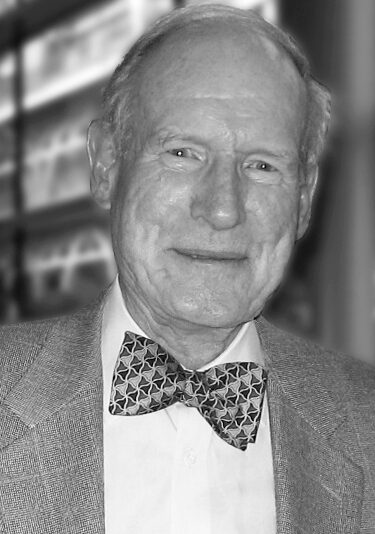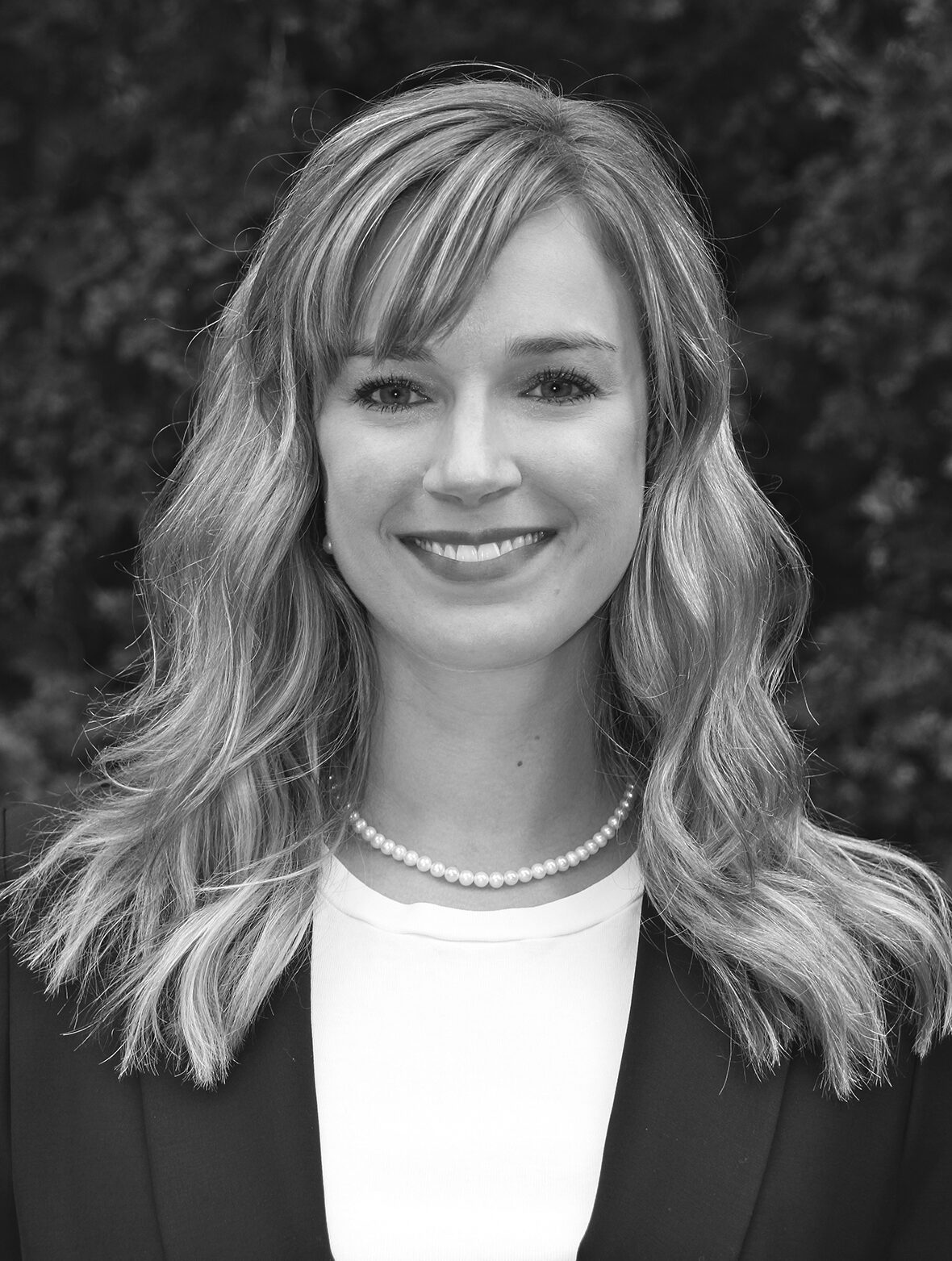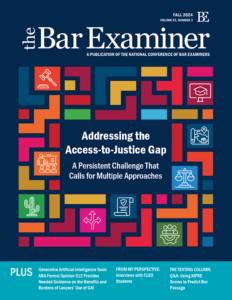This article originally appeared in The Bar Examiner print edition, June 2014 (Vol. 83, No. 2), pp. 38–44.
By Fred P. Parker III and Jessica GladBar Admission
Undocumented immigrants
Florida Board of Bar Examiners re: Question as to Whether Undocumented Immigrants Are Eligible for Admission to the Florida Bar,134 So. 3d 432 (FL 2014)
The Florida Supreme Court has held that undocumented immigrants are ineligible for admission to the Florida Bar.
The occasion for the Court’s decision was Jose Godinez-Samperio’s application for admission to the State Bar of Florida. Godinez-Samperio legally entered the United States from Mexico with his parents at age nine, but the family overstayed their tourist visas and settled in Tampa, Florida. After graduating from high school as valedictorian, Godinez-Samperio obtained a college degree from New College of Florida, and he graduated from Florida State University College of Law in 2011.
Godinez-Samperio subsequently applied for admission to the Florida Bar. Pursuant to a policy adopted in January 2008, the Florida Board of Bar Examiners requires all applicants to submit documentation pertaining to their citizenship or immigration status as part of their application to the State Bar. Godinez-Samperio petitioned the Board to waive the policy and disclosed his undocumented immigrant status. The Board approved the petition for a waiver, and Godinez-Samperio passed the Florida Bar Examination in July 2011. Upon completion of its background investigation in November 2011, the Board ruled to defer further consideration of Godinez-Samperio’s qualifications and to seek an advisory opinion from the Florida Supreme Court regarding whether undocumented immigrants are eligible for admission to the Florida Bar.
On March 6, 2014, the Court answered the Florida Board of Bar Examiners’ question by holding that “unauthorized immigrants are ineligible for admission to [t]he Florida Bar.” In reaching this decision, however, the Court was careful to articulate that “[t]he separate issue of [Godinez-Samperio’s] admission is not before the Court.”
Citing 8 U.S.C. § 1621, the Court noted that federal law generally restricts an undocumented immigrant’s ability to obtain a professional license. Although the Court acknowledged that state law can override the federal ban, it concluded that “there is no current State law that . . . permits this Court to issue a law license to an unauthorized immigrant.”
The Court rejected the assertion that unauthorized immigrants should be admitted to the Florida Bar based on executive policies such as President Barack Obama’s Deferred Action for Childhood Arrivals (DACA) program. “[T]he reliance . . . on these executive branch policies is misguided,” the Court stated. The Court explained that “[t]he policy provides that people who are granted DACA status will not be a priority for the executive branch in enforcing deportation laws; the policy explicitly states that it does not provide an unauthorized immigrant with lawful status.” The Court concluded:
. . . executive branch policies addressing deportation and the exercise of prosecutorial discretion . . . are not laws passed by Congress. These policies do not provide this Court with legal authority to disregard the laws currently enacted by Congress and admit unauthorized immigrants into Florida Bar membership.
In a “reluctant” concurrence, Justice Jorge Labarga agreed with the majority but expressed his disappointment in the decision. “[T]he Florida Legislature has failed to enact any law providing that unauthorized immigrants are eligible for certain public benefits, in this case a license to practice law,” he wrote. “Given this authority to determine the eligibility of a class of applicants to [t]he Florida Bar, the Florida Legislature is in the unique position to act on this integral policy question and remedy the inequities that the unfortunate decision of this Court will bring to bear.”
Character and Fitness
Disbarment; commingling of funds; testifying falsely under oath; insufficient repentance
F. Lee Bailey v. Board of Law Examiners, 2014 ME 58 (ME 2014)
This case was initially reported in an earlier issue of the Bar Examiner (Vol. 82, No. 4, December 2013). The following summarizes the latest developments in the case.
The Maine Board of Law Examiners appealed from the judgment of a single justice of the Maine Supreme Judicial Court which concluded that F. Lee Bailey presently possesses the requisite good character and fitness required to be admitted to the practice of law in Maine.
At a hearing, the Maine Board considered the following evidence:
In 1994 Bailey began defending Claude Duboc against charges of drug smuggling, money laundering, and related claims. Bailey’s proposal of a plea deal for the forfeiture of Duboc’s assets and a guilty plea included the separation of an asset that would appreciate in value and would not be subject to forfeiture. This asset was 602,000 shares of Biochem Pharma stock. On April 26, 1994, the stock was transferred to Bailey’s Swiss account. On May 17, 1994, the remainder value of the stock would be returned to the court and a motion would be filed for Bailey’s fees. While Bailey managed those assets, the stock increased in value, and during this time Bailey sold some of the shares, borrowed against the remaining shares, and then transferred over $3.5 million of the $4 million proceeds to his personal money market account. By December 1995 he had transferred all but $350,000 to his personal checking account. From that account Bailey used over $2 million for his private businesses, $1.3 million for personal expenses and purchases, and $138,946 for the purchase of a private residence. Bailey asserted that the increase in the value of the Biochem stock belonged to him since it was transferred to his account in “fee simple absolute.”
By late 1995, Duboc had become dissatisfied with Bailey’s representation and filed a motion to substitute new counsel. Before this hearing Bailey sent a letter to the presiding judge, Judge Paul, without copying the prosecutors, Duboc, or his new attorneys. In the letter, Bailey referred to Duboc as a “multimillionaire druggie” and alleged that the new attorneys had a conflict of interest and were giving Duboc harmful advice. He also acknowledged the ex parte nature of the letter.
Following a hearing, Judge Paul entered an order on January 12, 1996, removing Bailey as counsel, freezing all Duboc’s assets held by Bailey, and requiring Bailey to submit an accounting. Despite knowing about this order, Bailey thereafter spent over $300,000 of these assets for his own purposes. Judge Paul’s second order, on January 25, 1996, required Bailey to surrender all shares of the Biochem stock or any replacement assets and prepare a full accounting. Bailey then notified the Swiss authorities that the assets in his account were from drug trafficking, and the Swiss authorities froze the account. As a result, Bailey did not surrender the stock or proceeds as he was required to do. At a contempt hearing on February 2, 1996, Bailey testified that he had not physically seen the January 12 and January 25 orders until that morning. However, his associate had informed him of the orders’ contents. Bailey was held in contempt and was released after 44 days. Because Bailey had spent more than the approved expenses, he was ordered to pay an additional $423,737 to the court and to return the funds he had spent for personal expenses.
Following a hearing on the Florida Bar’s petition for Bailey’s disbarment, Judge Ellis found that Bailey had committed various ethical violations including (1) misappropriation of client assets and commingling them with personal assets, (2) ex parte communication, (3) self-dealing, (4) conflict of interest, and (5) false testimony under oath. Judge Ellis, pointing out the egregiousness of Bailey’s ethical violations and the aggravating factors, recommended that he be permanently disbarred. The Florida Supreme Court upheld all the findings and conclusions and ordered that Bailey be disbarred. The U.S. Supreme Court denied certiorari.
Bailey was also reciprocally disbarred in state and federal courts in Massachusetts in 2003 and 2006.
After disbarment the U.S. Tax Court determined that Bailey owed taxes and penalties in the amount of $1.9 million plus interest for his failure to report as income the portion of the Biochem proceeds that he had treated as his own. Tax liens were filed against Bailey for $4.5 million for his tax liability.
At a hearing on Bailey’s application, the Maine Board considered the same matters that Judge Ellis had considered on the Florida Bar’s petition along with the testimony of Bailey as to whether he had recognized the wrongfulness and seriousness of his prior misconduct. While the Board found that Bailey had not met his burden, on appeal the single justice found that he had met his burden of proving the requisite good character and fitness in all but one respect: his large outstanding tax obligation.
Reviewing the appeal from the single justice, the Maine Supreme Judicial Court found that Bailey had met his burden with respect to the ex parte communication; however, for the remaining misconduct, the Court found that Bailey had failed to prove by clear and convincing evidence that he recognized the wrongfulness and seriousness of the misconduct that resulted in his disbarment. Writing for the majority, Justice Jon D. Levy said that Bailey’s insufficiently contrite views about his transgressions were fatal to his admission. He acknowledged that “[n]either the language of the rule nor its purpose requires that an applicant demonstrate his complete and unambiguous acceptance of all of the findings of wrongdoing in order to establish his good character and fitness,” but stated that, as a matter of common sense, “the nature and extent of his failure to be fully repentant should be carefully considered when determining his fitness to practice law.”
The majority of the Court found that “[b]y continuing to question many of the findings and conclusions reached by the Florida Supreme Court, and by suggesting that [the judges] who presided in his cases were biased and that the Florida proceedings were the product of a conspiracy to deprive him of his constitutional rights, Bailey minimizes the wrongfulness and seriousness of the misconduct for which he was disbarred.”
Chief Justice Leigh I. Saufley, in a dissent joined by Justice Robert W. Clifford, said that the Court had “acted outside its appellate function in vacating the factual findings of a single justice who heard the evidence in the matter” and instead made “credibility determinations of its own and [chose] to give weight to different evidence than was credited by the single justice.” The dissenters said that they would remand the case with instructions that the single justice take more evidence and “reconsider whether the risk that Bailey would mismanage funds in the context of paying his substantial tax debt would render his admission to the Bar ‘detrimental . . . to the public interest’.”
The Court vacated the judgment of the single justice, and the matter was remanded for entry of a judgment affirming the order of the Board of Bar Examiners.
Registered sexually oriented offender
In re Application of Daubenmire, 137 Ohio St. 3d 435, 999 N.E.2d 669
Erratum: The June 2014 Litigation Update, page 42, inaccurately summarized the recommendation of the Supreme Court of Ohio Board of Commissioners on Character and Fitness in In re Application of Daubenmire. The text of the Litigation Update stated that the board recommended that Daubenmire be allowed to take the July 2014 exam. However, the board’s recommendation was that Daubenmire be allowed to reapply as a candidate for the July 2014 exam.
Zachary Daubenmire graduated from law school in 2011 and applied for admission to the Ohio Bar. A hearing was scheduled before a panel of the Board of Commissioners on Character and Fitness to question him about certain matters in his application.
Daubenmire testified that he was raised in a religious home and was a good student and a good athlete. His father was a minister and his football coach. He had no disciplinary problems in high school, but during his freshman year in college he was diagnosed with neurotic depression and began taking an antidepressant. He also began downloading pornographic pictures and videos of children under the age of 18. He said he was only interested in viewing teenage girls, but admitted that some of the images were of girls under the age of 18 but that he had convinced himself that watching their sexual activity online was preferable to actually engaging in such activities. He stated that he had no interest in viewing young, undeveloped children.
Daubenmire’s activity was discovered in 2006 when the family computer malfunctioned and his father sent it to a repair shop to have the data transferred to a new computer. The technician found the pornography and reported it to the authorities. There was no dispute that some of the videos depicted sexual activity involving children and that when Daubenmire was caught he had been viewing this illegal child pornography for five years.
Daubenmire cooperated with the criminal investigation and on the advice of counsel entered a no-contest plea. He was sentenced to five years of community control and ordered to register as a sexually oriented offender, to perform 100 hours of community service, to participate in sexual-offender counseling, and to abstain from alcohol.
Knowing that he would be barred from teaching and coaching, his chosen profession, Daubenmire accepted a job working as an assistant in a law firm, which inspired him to apply to law school. Daubenmire disclosed his conviction and was admitted to Case Western Reserve University School of Law in 2008. He graduated in 2011 and applied to take the Ohio Bar Exam.
At the hearing before a panel of the Board of Commissioners on Character and Fitness, Daubenmire’s long-term therapist testified that she believes that Daubenmire does not suffer from a sexual or deviance disorder, is unlikely to engage in the conduct that led to his conviction in the future, does not require additional therapy for sexual issues, and is fit to practice law. She stated that Daubenmire suffers from an anxiety disorder that can be managed with medication and is unrelated to his misconduct. The board recommended that Daubenmire’s application be disapproved, but that he be allowed to take the July 2014 exam.
The Ohio Supreme Court expressed grave concerns about permitting an applicant to take the bar exam and perhaps begin practicing law while he is legally obligated to register as a sex offender and disapproved the application. Since Daubenmire is obligated to register as a sex offender until February 27, 2017, the Court permitted him to reapply as a candidate for the July 2018 bar exam.
Substance abuse
In re Application of Kloeker, 137 Ohio St. 3d 1211, 998 N.E.2d 506
Christopher Kloeker did well academically at his undergraduate school, attended the University of Cincinnati School of Law, and graduated in 2012. In his application for admission to the Ohio Bar, he disclosed a series of criminal and traffic violations that were related to the use of alcohol or controlled substances. He failed to disclose that he had sometimes used cocaine and had taken other controlled substances. After his interview with the Hamilton Bar Association, his application was approved, but it was recommended that he be interviewed by the Ohio Lawyers Assistance Program (OLAP). Kloeker filed a supplemental application that revealed that during the first semester of his third year in law school, for a four- to six-week period, he had purchased Oxycontin from a friend to treat the pain from an injury to his foot and that when he could not get Oxycontin, he purchased heroin from the same friend.
Kloeker appeared before a panel of the Board of Commissioners on Character and Fitness, which considered this record and recommended that his application be disapproved but that he be permitted to apply for the July 2014 exam. Kloeker did not file objections.
The Ohio Supreme Court agreed with the board but concluded that a longer waiting period was required. The Court’s order stated that Kloeker could reapply for the July 2015 exam.
Miscellaneous
Requiring an out-of-state attorney to maintain an office in the state
Schoenefeld v. New York, 748 F.3d 464 (2d Cir. 2014)
This case was reported in two earlier issues of the Bar Examiner (Vol. 80, No. 1, March 2011, and Vol. 81, No. 1, March 2012). The following summarizes the latest developments in the case.
By order dated April 8, 2014, the United States Court of Appeals for the Second Circuit certified a question to the New York Court of Appeals regarding the minimum requirements necessary to satisfy New York Judiciary Law Section 470, which requires nonresident attorneys to maintain a New York office to practice in New York.
As detailed in the summary from the March 2011 Bar Examiner, the impetus for this case is Ekaterina Schoenefeld, an attorney licensed to practice in New York, New Jersey, and California. Schoenefeld maintains a residence and law office in Princeton, New Jersey. She filed this action challenging the constitutionality of Section 470, entitled “Attorneys having offices in this state may reside in adjoining state,” which provides:
A person, regularly admitted to practice as an attorney and counsellor, in the courts of record of this state, whose office for the transaction of law business is within the state, may practice as such attorney or counsellor, although he resides in an adjoining state.
On September 7, 2011, the United States District Court for the Northern District of New York entered a judgment declaring Section 470 unconstitutional as violative of the Privileges and Immunities Clause. The court concluded that the in-state office requirement discriminates against nonresident attorneys and infringes on their fundamental right to practice law without advancing any substantial state interest. Defendants subsequently appealed to the Second Circuit, where they assert that the office requirement imposed by Section 470 can be read in a manner that does not implicate the Privileges and Immunities Clause. They contend that “an ‘office for the transaction of law business’ requires only an address for accepting personal service, which ‘might’ be satisfied by designating an agent for the service of legal papers.”
Instead of ruling on the merits, the Second Circuit held that the New York Court of Appeals should first weigh in on the meaning of the statute and therefore certified the following question to the state court:
Under New York Judiciary Law § 470, which mandates that a nonresident attorney maintain an “office for the transaction of law business” within the state of New York, what are the minimum requirements necessary to satisfy that mandate?
The Second Circuit found that three factors warranted certification in this case. First, it noted that the Court of Appeals had not issued an opinion addressing the constitutionality of Section 470, nor had it been presented with the opportunity to interpret the phrase “office for the transaction of law business” as the phrase is used in the statute. Second, it stated that it could not predict how the Court of Appeals will interpret the statute “in light of the potential that the requirements in Section 470 violate the [Privileges and Immunities] Clause.” Finally, it noted that if the Court of Appeals accepts and answers the certified question, “that answer, in all likelihood, dictates the outcome of the constitutional privileges and immunities analysis we have commenced and must complete as we decide the appeal before us.”
 Fred P . Parker III is Executive Director Emeritus of the Board of Law Examiners of the State of North Carolina.
Fred P . Parker III is Executive Director Emeritus of the Board of Law Examiners of the State of North Carolina.
 Jessica Glad is Staff Attorney for the National Conference of Bar Examiners.
Jessica Glad is Staff Attorney for the National Conference of Bar Examiners.
Contact us to request a pdf file of the original article as it appeared in the print edition.







